Can you imagine telling someone their husband had died through a text message? The idea is almost unthinkable. Such traumatic news is usually delivered through intimate, private conversations between friends, family and medical professionals.
But what about the death of an ex? Jillian A. Tullis found out her ex-husband had died when a friend — who had been in her wedding years ago — let her know via text message. Tullis, an associate professor at the University of San Diego who studies communication around death and dying, was jarred by receiving the news through such a casual medium. Although she’d been divorced from her ex for several years, their marriage had been a significant part of her life. Having lost touch with him and his family, she didn’t even know whether he’d been sick — his death might have been the end of a long battle, or it might have been a freak accident. She had no way of knowing.
Tullis was grieving the death of her ex, but it was a grief that didn’t seem to fit into society’s perception of what grief should be. Her loss wasn’t considered on par with losing a current spouse or other family member, and there was no clear template for what she should do or how she could participate in mourning. She was experiencing something called disenfranchised grief.
The term “disenfranchised grief,” also called hidden or unacknowledged grief, was coined in 1989 by Dr. Kenneth Doka, an influential researcher who has written extensively about the grieving process. Disenfranchised grief is often experienced by people who have suffered losses not recognized by society — typically because either the loss or the griever themselves is misunderstood or stigmatized. Doka first recognized this type of grief in a case much like Tullis’: A woman in one of his classes had lost her ex-spouse and found that, rather than offering sympathy and comfort, many people ignored her loss or even congratulated her. Although their marriage had ended badly, she still grieved deeply for the loss of her high school sweetheart, the man she’d spent 25 years of her life with, the father of her children.
Disenfranchised grief can be isolating and difficult to understand, making it uniquely harmful to those who experience it. When someone loses a spouse or a child, their family, friends, and school or workplace are likely to anticipate their emotional needs. They might be given bereavement leave. Support groups may be available. Friends and neighbors may offer their condolences and volunteer to help out. When your ex-husband dies, however, no one brings over a casserole. The people in your life may not even be aware of the loss, and when they find out, they may not understand its impact.
While modern grieving practices are not as codified or traditional as they have been in the past, there is generally a set template for navigating a socially recognized loss. In most cases, there is a visitation, a funeral, and a burial or cremation. Cards and flowers are sent. One might find comfort in books, music, and movies about grief or join a support group. With disenfranchised grief, however, these rituals aren’t always so accessible or so obvious.
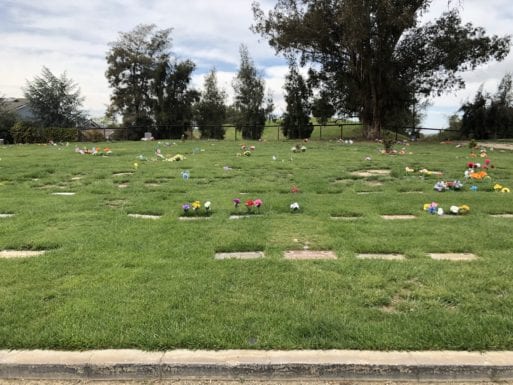
Tullis created her own rituals to deal with her disenfranchised grief, including rewriting her ex-husband’s eulogy and visiting his grave.
In the end, Tullis decided to make her own ritual for processing her disenfranchised grief — a task that she, as a grief researcher, may have been uniquely equipped for, but also one that many other survivors have undertaken as the conversation around these unrecognized losses opens up.
Who Are We Allowed to Grieve?
American culture puts a heavy emphasis on nuclear families, with little recognition of relationships that are not genetic or legally formalized. Once Tullis was no longer married to her ex, it was easier for people to assume that his death wouldn’t affect her. However, while her grief may have been less extreme than if she’d still been married to him, it was still very real — and somewhat more complicated.
“I immediately started having questions about what I should do,” Tullis said, noting how disenfranchised grief tends to stir up uncertainty. “It gives you a little bit of pause. ‘How do I handle this? Is it warranted for me to even have feelings? Am I allowed to grieve this person?’”
Tullis ended up creating her own grieving ritual: She rewrote his eulogy, which she felt was missing some important details of his life, and she visited his grave with her mother to pay her respects. She also called up some old friends who’d known them as a couple to process the news together. “I think people need to tell people that someone has died,” Tullis said. “I think there’s a function to that, even if it’s uncomfortable and we don’t like the way it feels.”
When we talk about loss, we often assume a sort of hierarchy of grief: the loss of a spouse, say, being more tragic than the loss of a friend. But as societal norms around nuclear families continue to change and expand, the importance of less formalized relationships is coming to light — along with the impact of their loss.
In 2020, a study led by Dr. Wai-Man Liu at the Australian National University found that the trauma of losing a close friend lasts four times longer than formerly believed. “Our study shows that the loss of their close friend can have a prolonged effect on the person’s mental health, emotional health and physical health,” said Liu. This finding illustrates how our grief doesn’t always match up to society’s expectations. “The death of a friend is a universal experience,” said Liu. “At some point in our life, we will experience the death of a friend, and there is no exception. But grieving the loss of a friend is not considered as important as the loss of a child or spouse so we have a tendency to dismiss the experience as merely transient episodes of emotional distress.”
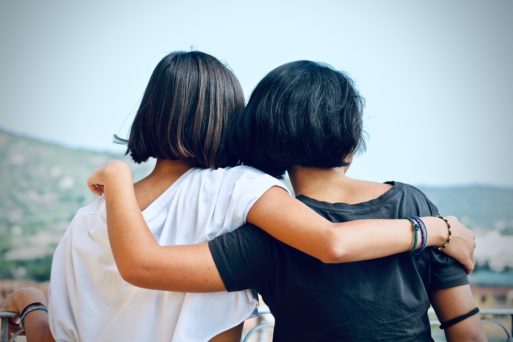
Even some romantic partnerships are not recognized by society, which can also result in disenfranchised grief. Debra J. Broderick, the interim director of counseling at University of St. Thomas in St. Paul, MN, who conducted a study on grief in lesbian partnerships, noted that the support systems in place for survivors in heterosexual relationships are not always as accessible to their LGBTQIA+ counterparts.
“Grief is, of course, a universal experience for all humans — it’s an experience that binds us together,” said Broderick. “How one expresses feelings of grief, adjusts to the loss of a loved one, and, ideally, finds meaning in the experience of grief depends on many things, but key is support the couple and the surviving member receives from family, friends, work, community, church, etc. The same variables are necessary in a same-sex relationship; the surviving member of the relationship needs the same level of social and familial support, validation, and recognition of their loss as a heterosexual survivor,” she added.
Loss Doesn’t Always Mean Death
While the death of a loved one can be deeply painful, death itself brings a certain closure with its finality. Grieving someone who is still alive can be a very complex emotional process, in which the mourner may struggle to accept the situation or go through grueling cycles of hope and disappointment. Such losses also tend to take place over long periods of time; with good reason, many survivors who lose loved ones to drug addiction, mental illness or cognitive conditions admit feeling some sense of relief.
We tend to think of death as a singular event, a clear line that one either has or hasn’t crossed. With many long-term conditions, however, loss doesn’t happen all at once. “They’ll often say something like, ‘I feel like my mother has died twice,’” said Katherine Supiano, Ph.D., a researcher at the University of Utah who works with care partners of people living with dementia. “’Once when her personality deteriorated and she didn’t recognize me, so that changed our relationship forever, and now her body is dying.’”
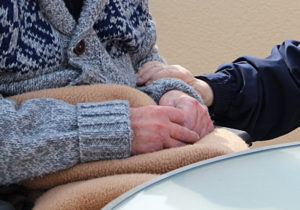 While most dementia care partners are prepared for the eventual loss of their loved one, said Supiano, a significant subset are at risk for disenfranchised grief. “Ironically, they tend to be the very best caregivers. They worry a lot, they stay up with things. They assume the entire burden of that person’s disease experience on themselves. Those people, at the time of death — they’re really fraught with ‘I didn’t do enough,’ or ‘I shouldn’t have put her in the nursing home.’ Or ‘how am I going to live without her? How am I going to live without this role?’”
While most dementia care partners are prepared for the eventual loss of their loved one, said Supiano, a significant subset are at risk for disenfranchised grief. “Ironically, they tend to be the very best caregivers. They worry a lot, they stay up with things. They assume the entire burden of that person’s disease experience on themselves. Those people, at the time of death — they’re really fraught with ‘I didn’t do enough,’ or ‘I shouldn’t have put her in the nursing home.’ Or ‘how am I going to live without her? How am I going to live without this role?’”
These care partners can be particularly vulnerable as they navigate their loss, and part of Supiano’s work is helping them become equipped to handle the transition. That means providing support not just leading up to the death of their loved one, but after it as well. “We always say the worst part of grief is the day when the casseroles stop coming and the flowers are all dead,” said Supiano.
Being there for someone who is going through grief — particularly a type of disenfranchised grief, which may be harder to recognize or respond to — can be challenging for even the most well-intentioned friend or family member. “We are really uncomfortable with other people’s grief. Because we’re uncomfortable with it — and because, for all the right reasons, we just want people to be better, we just want them to be happy again — we are impatient with the process of grief,” said Supiano Because of this, she emphasizes the importance of “grief literacy” — providing people with the tools to recognize, talk about and deal with the many forms of grief.
No One Else Understands — Until Someone Does
Stigmatized deaths such as those caused by addiction can lead to a particularly painful form of disenfranchised grief. Loved ones of those who die fron overdose, in particular, often feel guilty, wishing they could have done more to help the person before a trgic overdose took their life. All too often, this guilt can be compounded by the perceived judement of others and a lack of social support.
The stigma around addiction can have a detrimental impact on those experiencing it, but also on the people who love them. While some people may assume that addiction is the result of weakness or bad judgment, data shows that the root of addiction is actually much more complicated — and it can happen to anyone.
When a loved one is suffering from addiction, it can be tempting to blame someone close to them — a family member, a partner, a friend. In reality, however, only the person with the addiction has control over their own recovery. Whether they are able to overcome their addiction depends on many factors, not all of which are fully understood.
Even when people mean well and want to be supportive, they are often uncertain of how to respond after a stigmatized death. They may fear saying the wrong thing or feel they should avoid bringing it up. Unfortunately, saying nothing is often the most harmful choice one can make.
It can be difficult to know how to reach out to someone after a stigmatized death, but the important thing is to try. A text, a note, a phone call — anything is better than silence. Sometimes the most powerful thing one can do is just listen. Many people who have lost loved ones to overdose feel isolated and unsure of what, if any, role they played in their loved ones addiction and ultimately their death. What they need most, many say, is simply someone to hold space and listen to them in a non-judgemental way.
Everyone Has the Right to Grieve
People with intellectual disabilities sometimes experience and express emotions in ways that aren’t obvious to their neurotypical loved ones. Some disabilities may affect an individual’s perception of events, which can lead those around them to believe that they don’t fully understand what’s happening and therefore aren’t experiencing an emotional response to it. People with intellectual disabilities can also face challenges in processing and verbalizing the intense emotions of grieving. For these reasons, people with intellectual disabilities can be especially vulnerable to disenfranchised grief.

Marc Markell
Marc Markell is an educator and speaker based in Minnesota who specializes in grieving for people with cognitive disabilities. In his work with special education students, he found that their grief was often not properly acknowledged and that they sometimes needed additional help to understand what was going on. Often, they would be excluded from funerals and visitations.
There were two reasons for this, Markell said. “One is that they won’t understand death. Absolutely. But who does? It’s a really hard concept to wrap your mind around. If the person was here one day, then they’re not here — it’s almost a surreal experience. It takes people time to understand.” Another frequent concern was that the griever with cognitive disabilities would act out at the funeral. This was often a valid concern, said Markell. “If a person acts out, they’re going to act out. But let’s look at what we can do to include this person and not exclude them.”
What Markell frequently suggests is for the families of grievers with intellectual disabilities to take them to the funeral home or visitation early so that they have time and space to process the experience in their own way. If this isn’t possible, families can sometimes take pictures to show the person before or afterward to help them understand or prepare. He advises families and caregivers to find ways to accommodate that person’s style of grieving, even if it’s different from theirs.
Markell once counseled a group home who had recently lost one of their residents. He talked with the other residents to help them understand and process the loss. “They had some of the greatest questions,” said Markell. “One resident said, ‘Can I still love him?’ And I said, ‘Absolutely. Love doesn’t die.’” The residents were very upset that the man’s room was going to be changed out; in a family home, this is a transition that can be eased into after several months or even years, but the group home needed to accommodate a new resident. Markell suggested that the residents take pictures of the man’s room as it was, and then put the pictures on the door to the room. That door was removed and placed in the community living room, so that it still felt like the door to his room, while the room was fitted with a new door for the new resident.
One of the biggest misconceptions about the grief of people with cognitive disabilities, said Markell, is that their grief is not as deeply felt as that of people without disabilities. “Grief is paradoxically individual and universal,” he said. “Anyone capable of loving is going to grieve.”
Fighting the Isolation of Reproductive Grief
As many as one in five pregnancies end in miscarriage, but the subject is still widely misunderstood and rarely talked about. Despite being deeply painful and causing lasting trauma for many who experience it, miscarriage is often minimized and dismissed by society, leaving survivors to grapple with disenfranchised grief.

Tristan McBain, Ph.D.
“Reproductive loss is more personal and more connected to the body than a loss from the death of an adult loved one,” said Tristan McBain, Ph.D., a marriage and family therapist based in Michigan whose research focuses on infertility and miscarriage grief. “While those passings are certainly sad and perhaps tragic and can affect us, reproductive loss really adds an additional layer of grief because there is that close personal connection with the body.” Miscarriages do not always occur in medical environments, and the experience can be graphic and traumatizing, especially if the person does not know what to expect. Experiencing such a devastating loss in a visceral, physical way can be deeply impactful for both the pregnant person and their partner.
“There’s an element of stigma with reproductive loss,” said McBain. It is common for expecting parents to wait 12 weeks until sharing their pregnancy with friends and family. The idea is that this will spare them from having to tell everyone if they experience an early miscarriage, but if a miscarriage does occur, said McBain, this silence can also be isolating. “You end up enduring the miscarriage alone.”
Individuals can also struggle with grief when they are unable to have children or find out they are incapable of having children — a grief that can last a lifetime and even intensify as the biological window closes.
Reproductive grief can also be complicated by misconceptions about who experiences it — and how. Societal expectations may be different depending on a person’s gender identity. Trans, genderqueer, and nonbinary individuals are often left out of the conversation around reproductive loss altogether, despite being no less affected by these experiences. This can add further complication to already disenfranchised grief. “These individuals encounter additional layers of stigma in addition to their grief experiences often being overlooked by existing support structures,” said McBain.
Although there are still many barriers to accessing support for reproductive grief, resources are available — and asking for help is better than suffering in silence. “If you are in a dark place, it doesn’t mean there isn’t helpful support out there that you can utilize,” said McBain. “Reaching out to one person can start a domino effect of getting help.”
Losing a Best Friend — with Four Legs
Losing a pet is perhaps one of the most under-recognized sources of grief we encounter in life, but its impact can be intense. Many people bond with their pets over more than a decade, drawing comfort and companionship from them through many phases of life. The pain of losing one’s pet can be exacerbated when friends and family fail to recognize the intensity of the loss, and survivors may struggle with disenfranchised grief.

Kathleen Clohessy, editor-in-chief at SevenPonds and a long-time pet parent, knows all too well how the death of a pet can leave one feeling isolated and alone. In December 2019, her blind, 15-year old dog, Joey, drowned in a backyard swimming pool. “I was absolutely devastated,” Clohessy said. “Losing him was awful, but losing him that way was almost more than I could bear. He was my constant companion for 10 years. I couldn’t stop thinking about the fact that I wasn’t there for him when he needed me the most.”
Friends and family tried to be supportive, Clohessy said, but their words were small comfort as she struggled with her grief. “I can’t tell you how many times a well-meaning friend said, ‘He was so old; he was going to die soon anyway,’ or ‘Go to the shelter and adopt another dog; it will cheer you up.’ I know they were trying to be helpful. But their words had the opposite effect. I felt worse because no one seemed to understand that I didn’t want another dog. I wanted my Joey back.”
These kinds of reactions among friends and family of bereaved pet parents are very common, says Marty Tousley, a masters-prepared psychiatric nurse and grief counselor who serves as a consultant to the Pet Loss Support Group at Hospice of the Valley in Phoenix, Arizona, and to the Ontario Pet Loss Support Group in Ontario, Canada. “Not all those in your circle may be as understanding, as available or as capable of helping as you need them to be,” she wrote. “You may find that friends and relatives are finished with your grief long before you are done with the work of it or the need to talk about it,” she added.
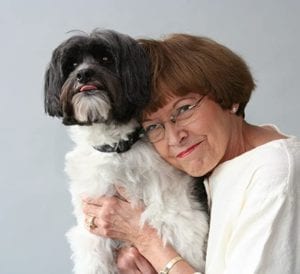
Marty Tousley, R.N., M.S., poses with the family dog
Barbara Karnes, R.N., an end-of-life educator who has authored a series of short books that help families navigate death and dying, agrees. “It is generally those persons who have not had a close relationship with an animal who find it difficult to empathize and support a person in their grief for their pet,” she wrote in “A Place in My Heart: When Our Pets Die.” Karnes urges those bereaved by pet loss to “seek the company of people who you can relate to” and who understand the depth of the pain losing a pet can cause.
Fortunately, that kind of support has become easier to find in recent years, thanks to a growing understanding among mental health professionals that pet loss can be a source of deep, enduring grief. Tousley, for example, writes extensively about pet loss on her website, Grief Healing Blog, where she also hosts an online pet loss discussion group where grieving pet parents can seek guidance and support. Additionally, many veterinary clinics now offer pet loss support groups for bereaved families as well as ongoing counseling for those who are caring for an animal who is terminally ill.
The Conversation Continues
“When you name something, you have some control over it,” said Dr. Kenneth Doka. Since he introduced the term over 30 years ago, disenfranchised grief has become a widely recognized concept in the grief research and counseling fields. Many therapists have an understanding of disenfranchised grief and how to guide people through it, and several researchers have written on the subject.
The ever-advancing world of technology has also yielded new resources for people suffering from disenfranchised grief. With information and support available online for a wide array of grief experiences, people who once felt isolated and confused in their grief may be able to find guidance and community. For people dealing with pregnancy loss, for example, there are a numerous online communities that offer information, comfort and support. And for those who have lost a loved one to substance abuse, there is GRASP, (Grief Recovery After Substance Passing), which provides online support as well as local chapters throughout Canada and the U.S. Additionally, many support groups for care partners of people living with dementia and Alzheimer’s disease are available online, including the message board ALZ Connected. Sponsored by the Alzheimer’s Association, the group offers family members, caregivers and people with dementia a safe place to discuss issues and get advice from others who are living with the same challenges they face.
Ultimately, addressing disenfranchised grief means facing the taboos and cultural barriers we have around grief in general. While it’s natural to feel uncomfortable or uncertain talking to someone about their loss, staying silent only creates more isolation. Support can be as simple as asking someone how they’re doing — and being ready to listen when they tell you.
This is something that palliative care specialists like Katherine Supiano have learned in their work: “The art of palliative care is saying to a family or a client or a patient — help me understand your preferences, so that I know how best to honor them,” said Supiano. “’Help me understand how I can be most supportive of you now. Maybe you’re going to want something different next month. Maybe you need food this month, or maybe you need me to watch your kids next week, or maybe you really don’t want me in your face, but you’d welcome a thoughtful note or a text saying I’m thinking of you.’ Everyone’s going to be different — but just ask them.”

 Survivors Are Breaking the Taboos Around Disenfranchised Grief
Survivors Are Breaking the Taboos Around Disenfranchised Grief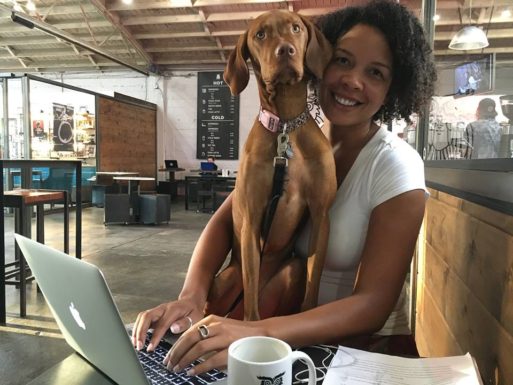




 “Help Me, Helen”
“Help Me, Helen”

 “As Tears Go By” by Marianne Faithfull
“As Tears Go By” by Marianne Faithfull














